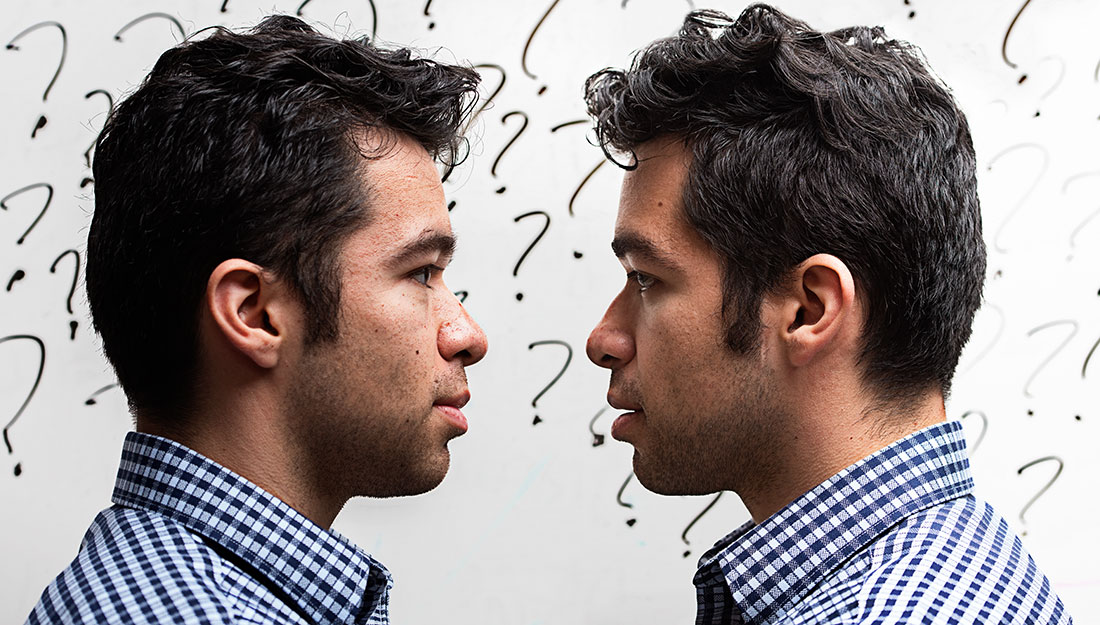Cause of Deja Vu All Over Again

Yous Asked: What causes déjà vu?
Glitches in the encephalon or a glimpse into the future?
April thirteen, 2016
Yous walk into a room and suddenly your brain goes fuzzy with an overwhelming wave of familiarity—although this is a totally new feel. Similar something out of a sci-fi plot, it almost seems as if you've walked into the future.
Chances are, you lot've experienced this situation, known as déjà vu, during your life. Déjà vu (French for 'already seen') occurs in approximately 60 to 80 percentage of people—a miracle that's about always fleeting and may manifest at whatever time. Despite wide-spread coverage, bursts of déjà vu are still misunderstood past the scientific community.
"Because there is no clear, identifiable stimulus that elicits a déjà vu experience (it is a retrospective report from an individual), information technology is very difficult to study déjà vu in a laboratory," said Michelle Claw, Ph.D., assistant professor in the Department of Neuroscience and Experimental Therapeutics, at the Texas A&M Health Science Centre College of Medicine.
A glitch in the brain?
"According to many studies, approximately two-thirds of individuals have experienced at least one episode of déjà vu in their life," Hook said. "Understanding how retention storage works may shed some calorie-free on why some experience information technology more than others."
Episodes of déjà vu may exist closely related to how memory is stored in the brain. Retention of long-term memories, events and facts are stored in the temporal lobes, and, specific parts of the temporal lobe are also integral for the detection of familiarity, and the recognition of sure events. The takeaway: The temporal lobe is where yous make and shop your memories.
While déjà vu's connectedness to the temporal lobe and memory retention is still relatively unknown, clues nearly the condition were derived from people who suffer from temporal lobe epilepsy (a condition in which nerve jail cell action in the brain is disturbed—causing seizures). Findings suggest that déjà vu events may be caused by an electric malfunction in the brain.
Epileptic seizures are characterized by dysfunctional neuron (nerve cell) action across the brain which disrupts the electrical impulses that 'fire' neurons. These impulses can spread across the whole brain—inducing seizures. "
"Clinical reports published in Epilepsy Research and Treatment by researchers at the University of Leeds prove that some patients who suffer from temporal lobe epilepsy study experiencing déjà vu, almost as a sort of warning, before an epileptic seizure event," Hook said.
Just, what is the basis for déjà vu in salubrious people without epilepsy? Some researchers describe it as a 'glitch' in the brain—when the neurons for recognition and familiarity burn—allowing the brain to mistake the present for the by. In fact, the aforementioned aberrant electric impulses that contribute to epilepsy tin can present in healthy people. An instance of this is a hyponogogic wiggle (an involuntary muscle spasm that occurs as a person is falling asleep).
Shortcuts in neural pathways
Instances of déjà vu in healthy individuals may likewise be attributed to a 'mismatch' in the encephalon's neural pathways. This could be because the brain is constantly attempting to create whole perceptions of the world effectually us with limited input.
For example, it but takes a small corporeality of sensory information—similar a familiar smell—for the brain to create a detailed recollection. Déjà vu could exist linked to discrepancies in the memory systems of the brain, leading the sensory information to by-laissez passer short-term retention and reach long-term memory instead. This may produce the unsettling feeling that we've experienced a new moment before.
In the visual system, sensory information travels through multiple pathways to the higher cortical centers of the brain (areas that play a key role in retentivity, attention, perception, awareness, thought, language and consciousness), with all data reaching those centers at or effectually the same time.
"Some suggest that when a difference in processing occurs along these pathways, the perception is disrupted and is experienced as two separate messages. The brain interprets the second version, through the slowed secondary pathway—as a split up perceptual experience—and thus the inappropriate feeling of familiarity (déjà vu) occurs," Claw said.
According to Hook, there is still much to larn about déjà vu and the mechanisms behind it. "There may not be a uncomplicated respond for the mechanisms behind déjà vu yet, but, with farther enquiry and studies, conclusive evidence for the phenomenon may exist discovered in the future," she said. Wouldn't that be similar experiencing déjà vu all once more?
Source: https://vitalrecord.tamhsc.edu/you-asked-deja-vu-causes/